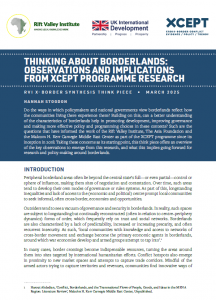Do the ways in which policymakers and national governments view borderlands reflect how the communities living there experience them? Building on this, can a better understanding of the characteristics of borderlands help in promoting development, improving governance and making more effective policy and programming choices in these contexts? Such are the questions that have informed the work of the Rift Valley Institute, The Asia Foundation and the Malcom H. Kerr Carnegie Middle East Center as part of the XCEPT programme since its inception in 2018. Taking these concerns as its starting point, this think piece offers an overview of the key observations to emerge from this research, and what this implies going forward for research and policy-making around borderlands.
The briefing elaborates on these points in the form of five observations derived from the XCEPT programme’s research, followed by some thoughts on the future direction borderlands research might take:
- Observation 1: On the centrality of borderlands, centre–periphery relations and the question of agency
- Observation 2: On the importance of revenues
- Observation 3: On binary thinking
- Observation 4: On the fluid, multifaceted nature of borders
- Observation 5: On unintended consequences
XCEPT PROGRAMME
This think piece is a product of RVI’s Cross-Border Conflict Evidence, Policy and Trends (XCEPT) research programme. XCEPT brings together leading local and international experts to examine conflict-affected borderlands, how conflicts connect across borders, and the factors that shape violent and peaceful behaviour. The programme carries out research to better understand the causes and impacts of conflict in border areas and their international dimensions. Funded by UK International Development, XCEPT offers actionable research to inform policies and programmes that support peace, and builds the skills of local partners. The views expressed do not necessarily reflect the UK government’s official policies.




